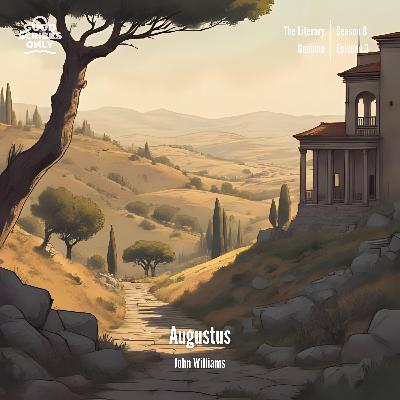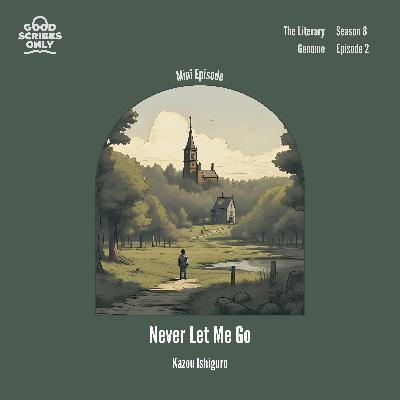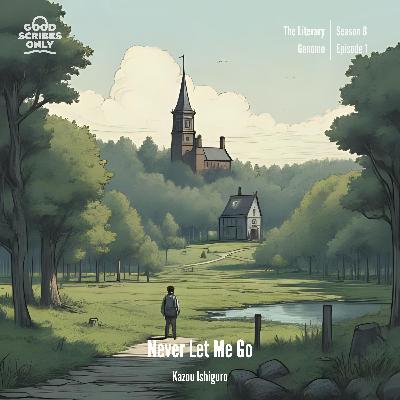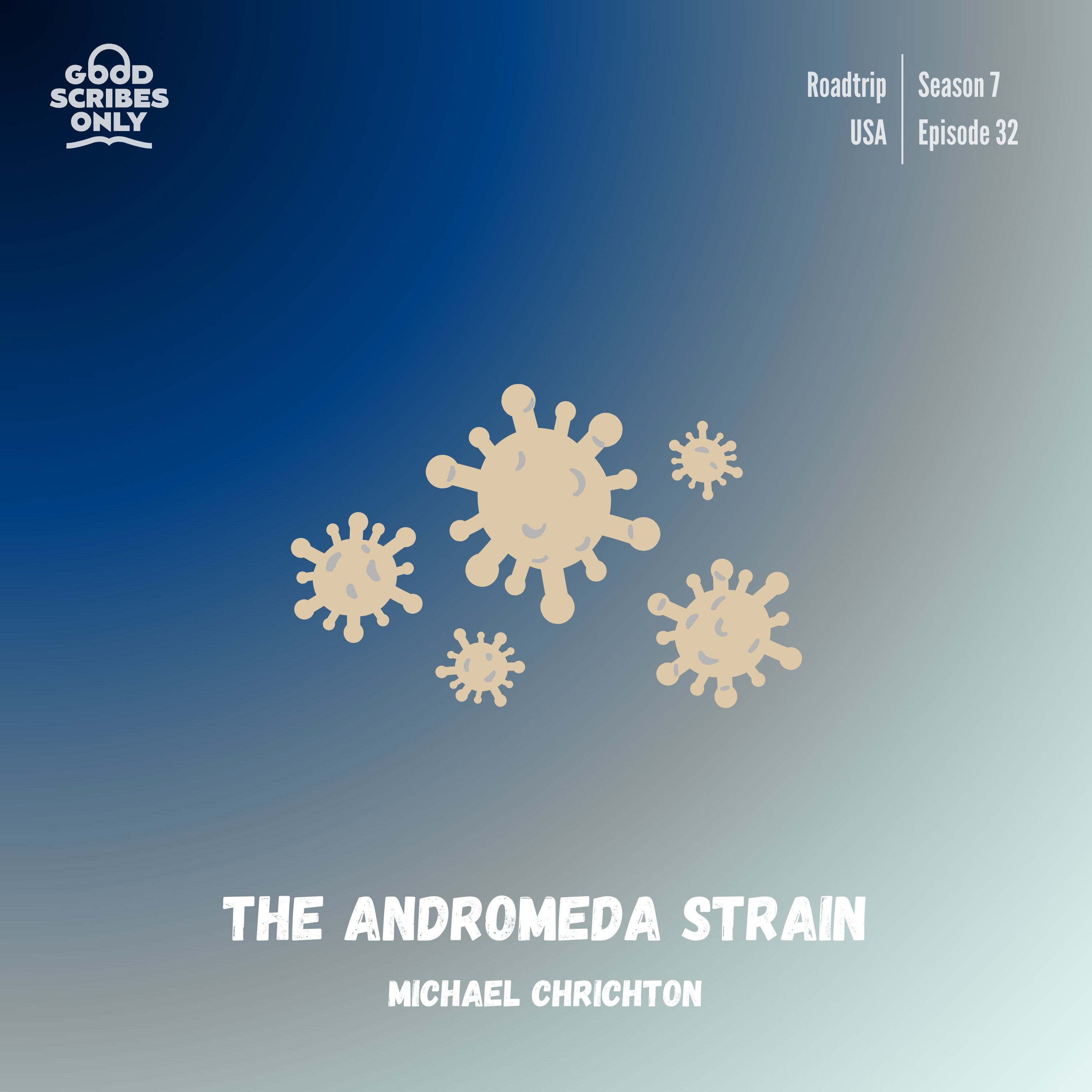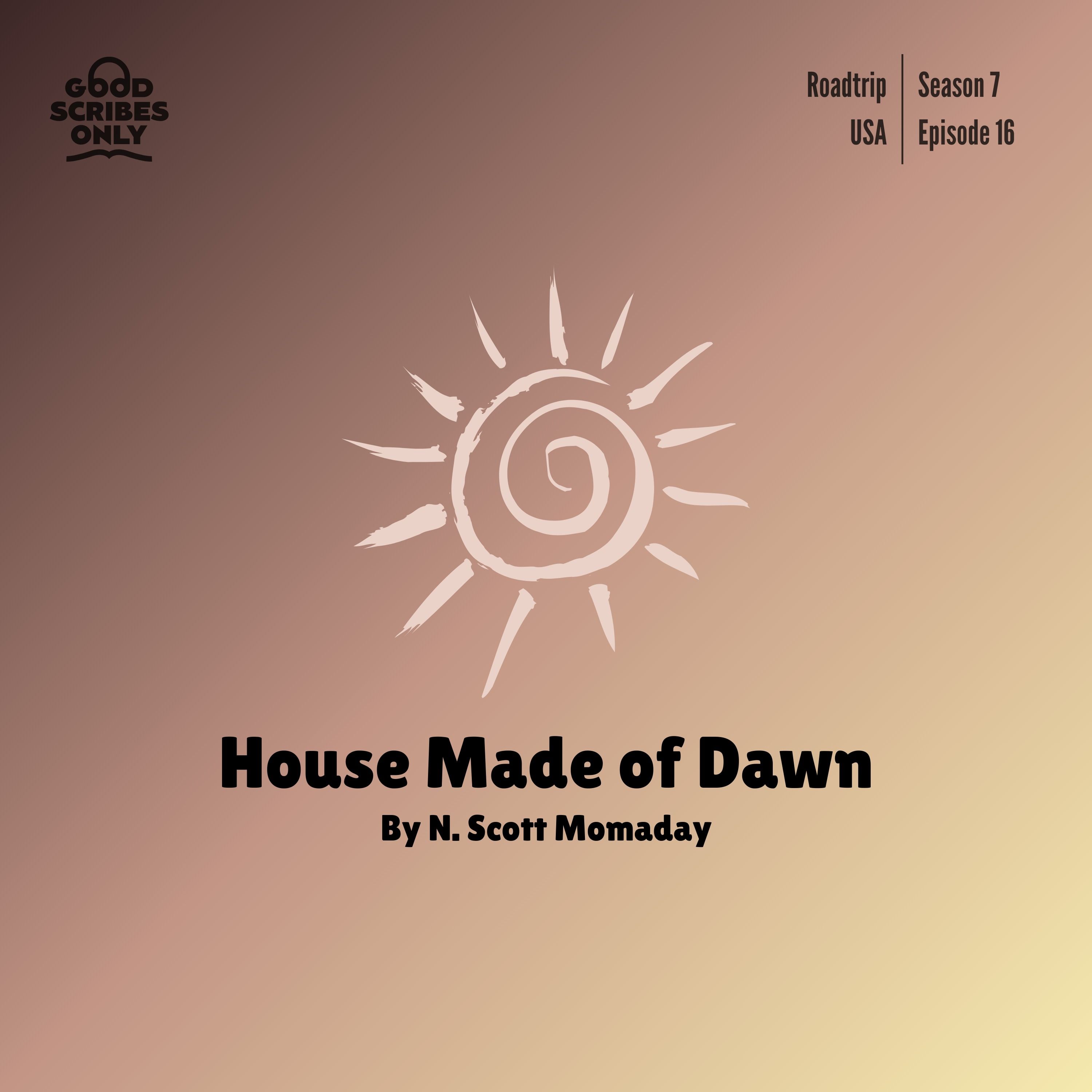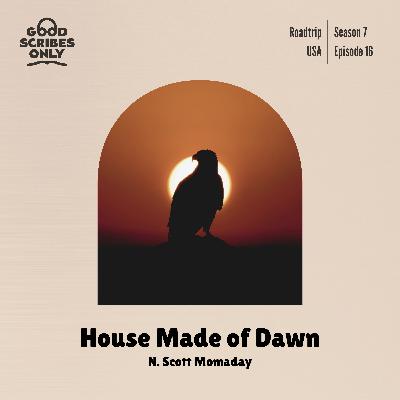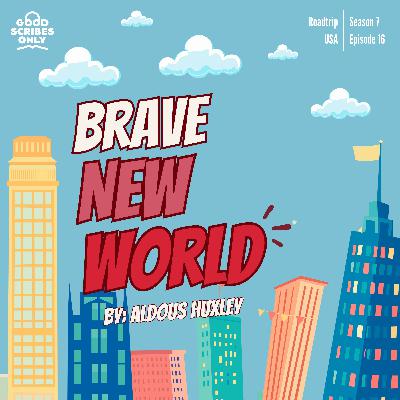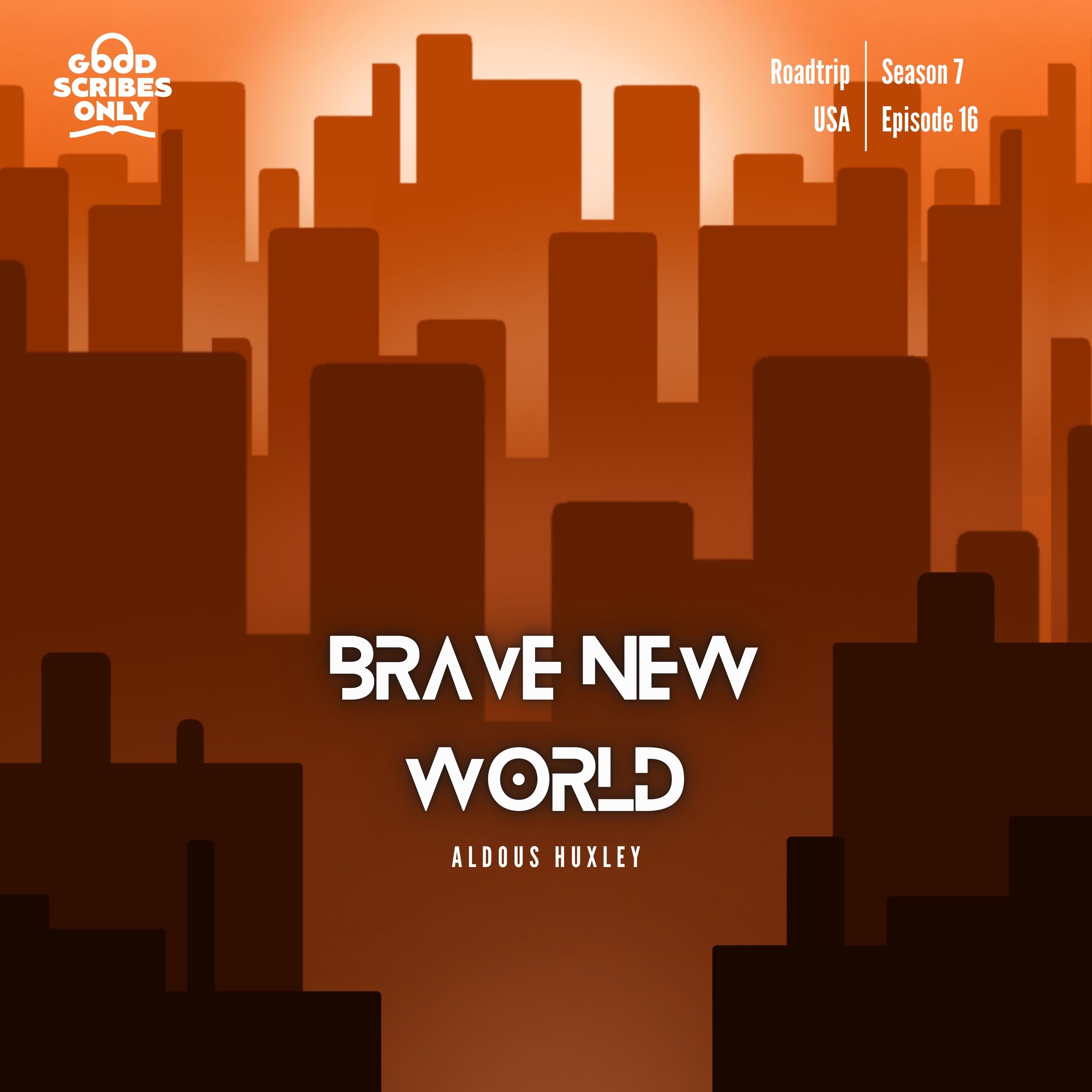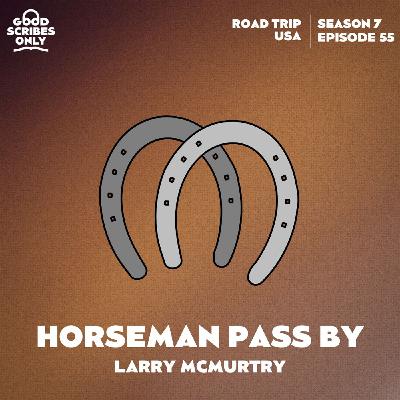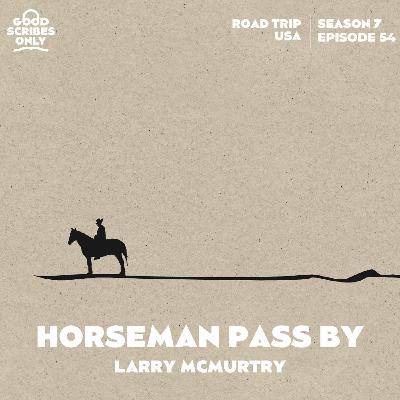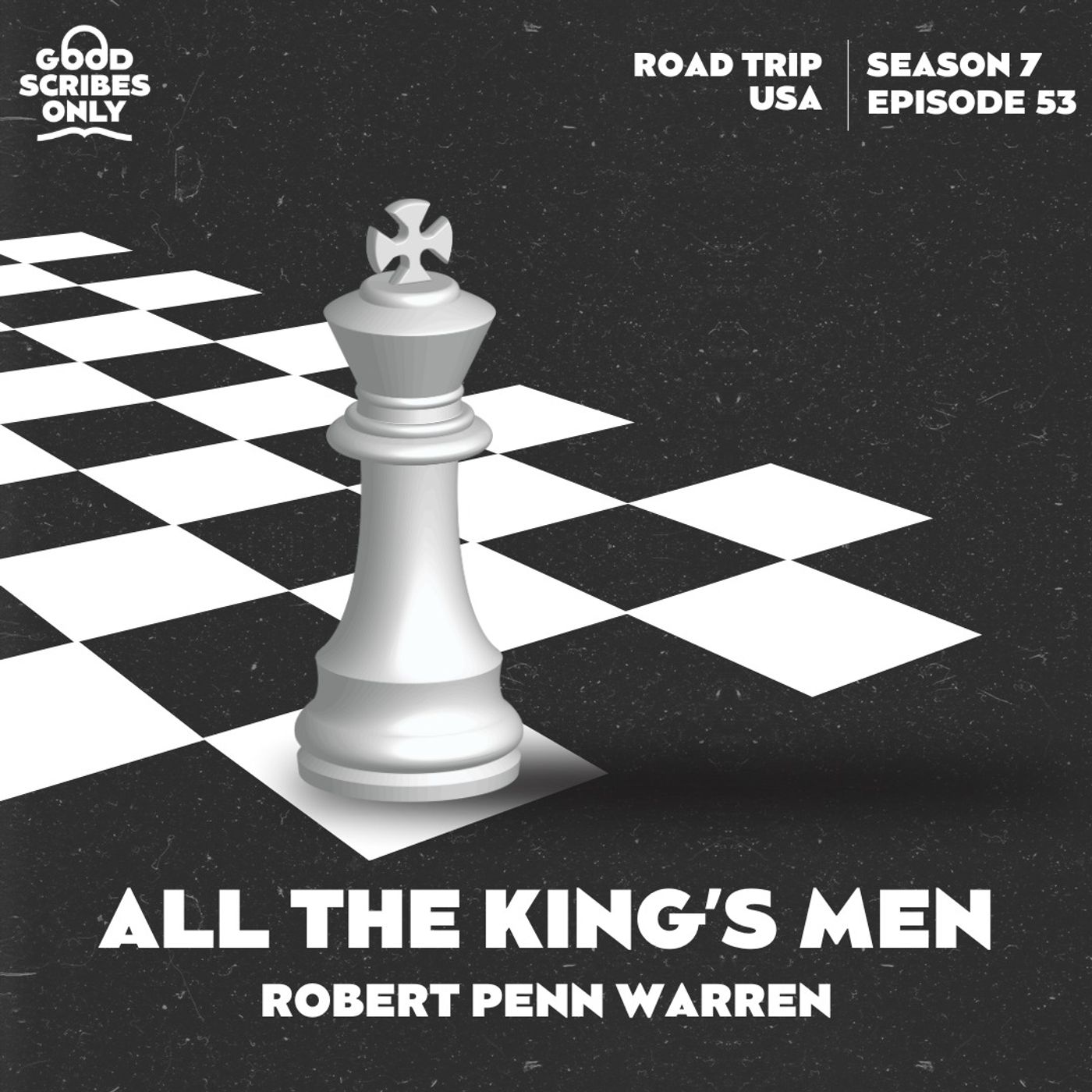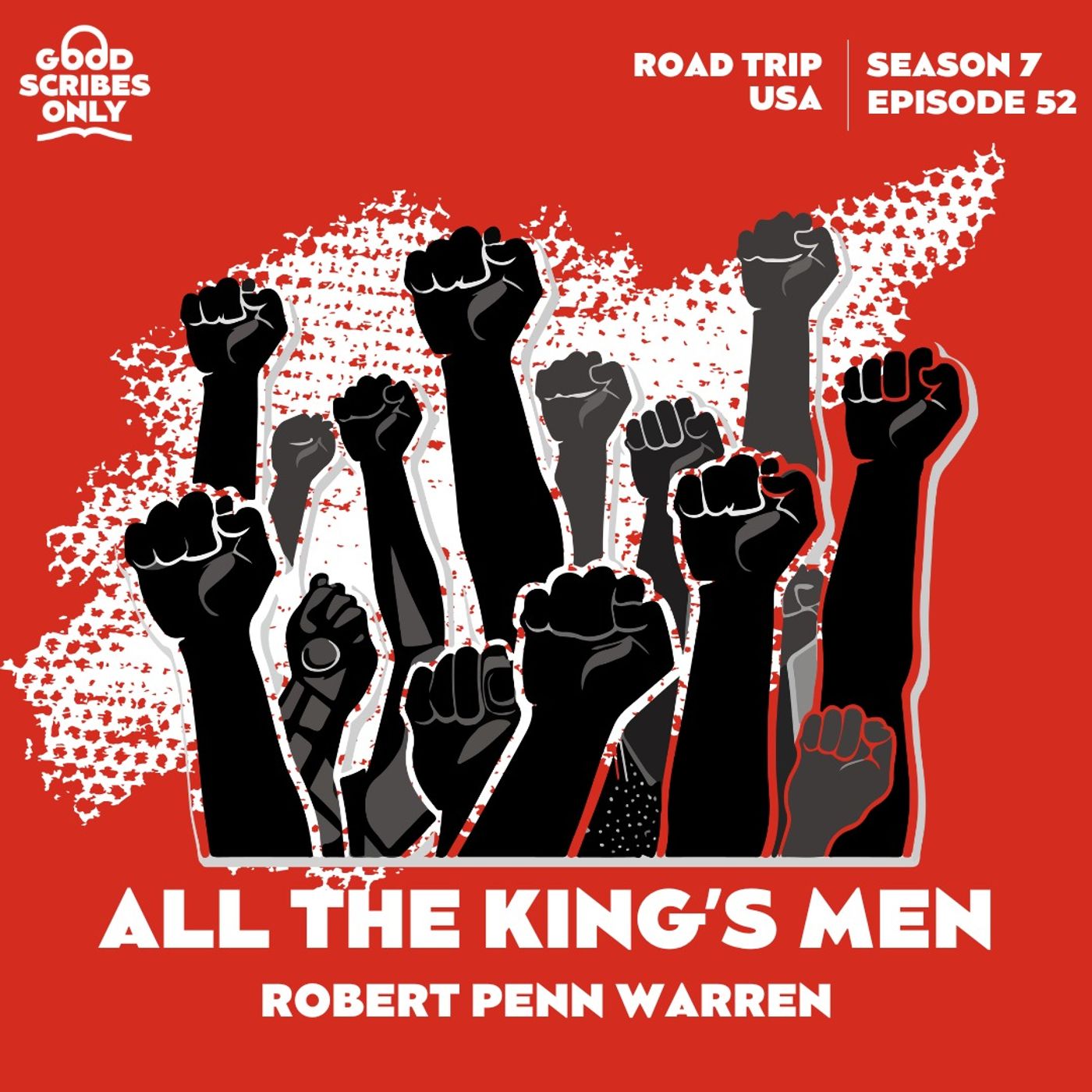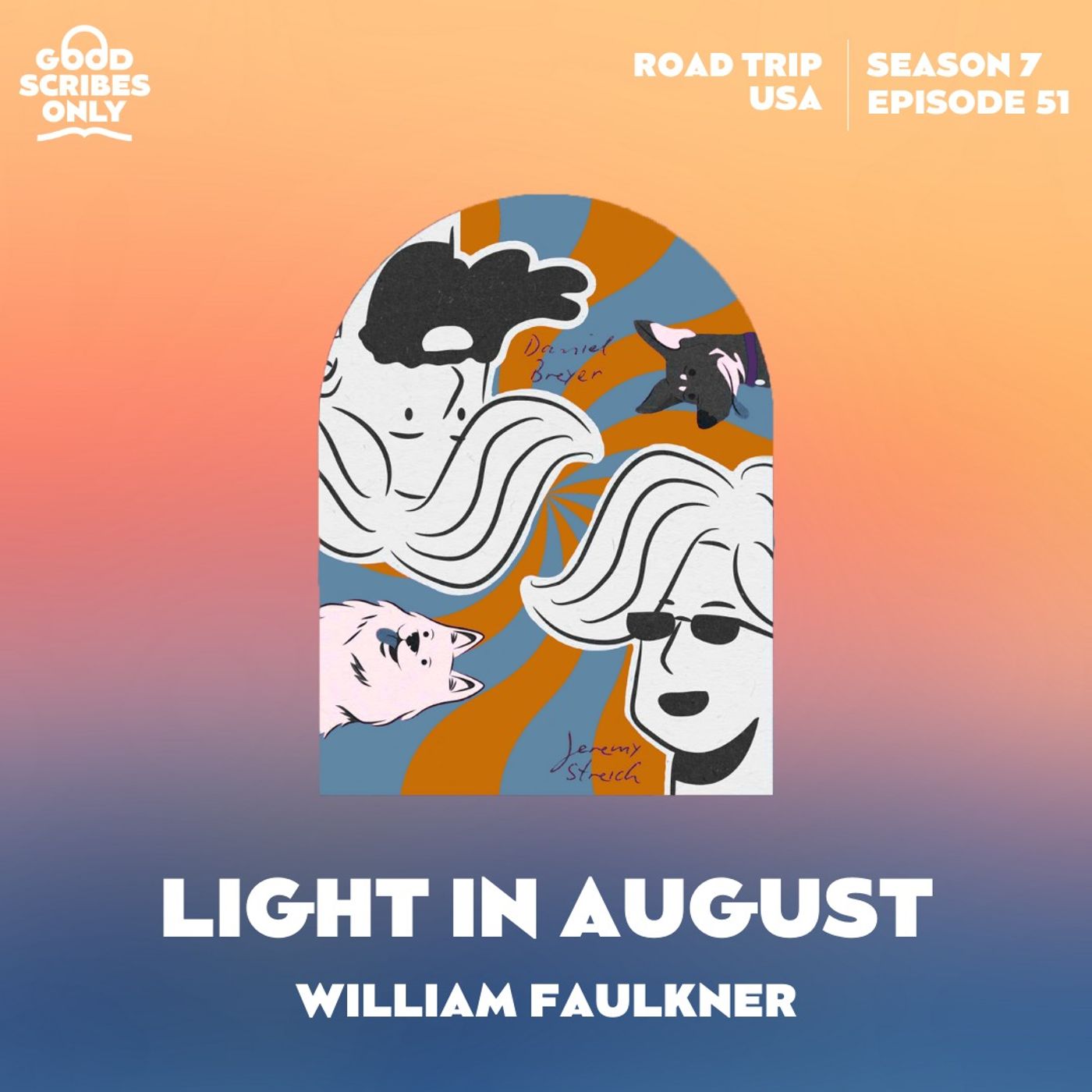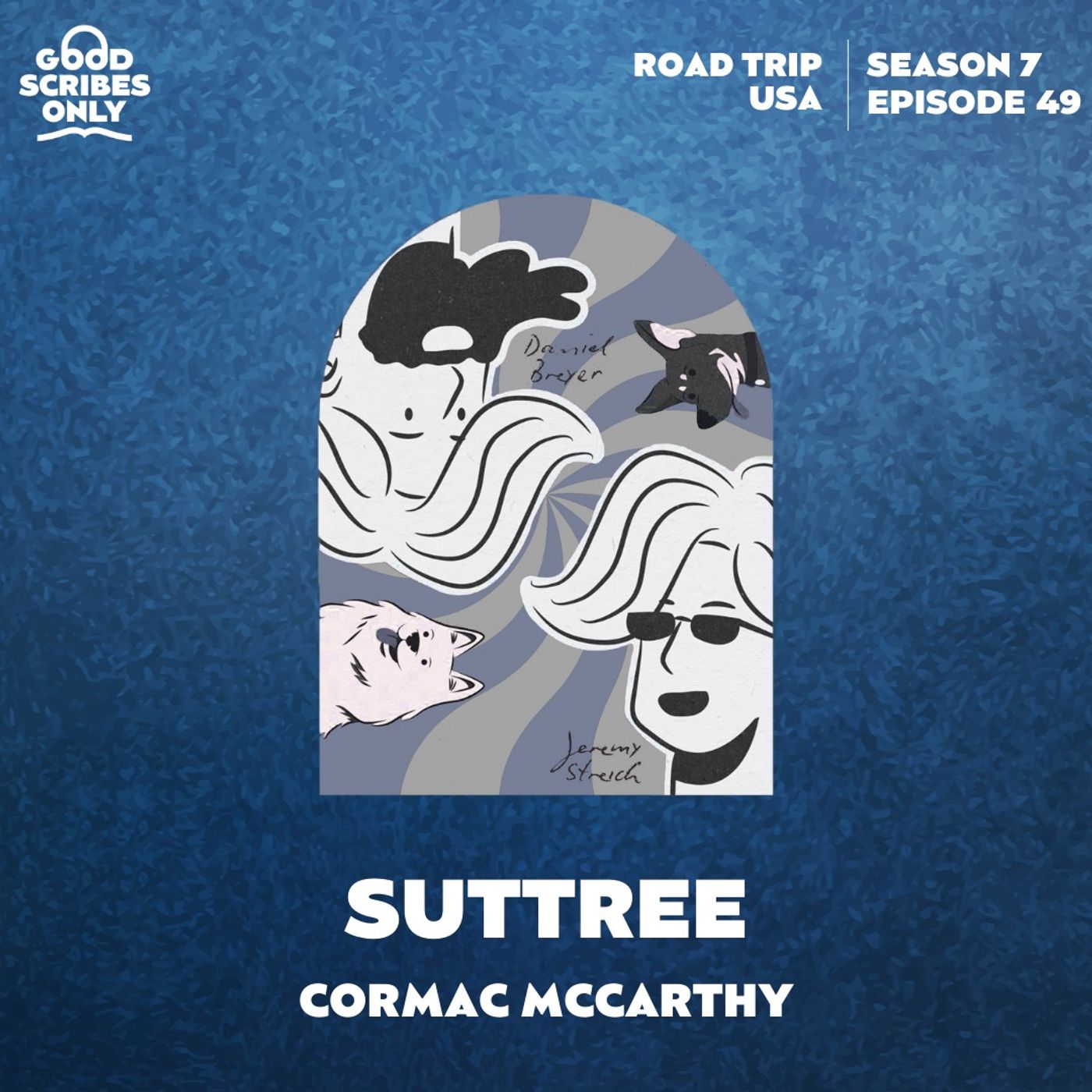Discover Good Scribes Only
Good Scribes Only

Good Scribes Only
Author: Daniel Breyer, Jeremy Streich
Subscribed: 6Played: 119Subscribe
Share
© 2022 - Good Scribes Only
Description
Good Scribes Only is a podcast featuring a novelist + venture investor (Daniel Breyer) and a novelist + founder (Jeremy Streich), who share an enthusiasm for literature. From classics to sci-fi, moderns to ancient philosophy, your hosts will ramble and banter about it all—particularly the topics they have no business discussing.
Each episode dives into the craft of writing as well as questions of plot, character, theme, and philosophy in a work.
Each episode dives into the craft of writing as well as questions of plot, character, theme, and philosophy in a work.
153 Episodes
Reverse
About the Book:Published in 1972, Augustus by John Williams is a masterful historical novel that chronicles the life and rule of Rome’s first emperor. Told through a series of letters, journal entries, and memoirs, the book captures the political intrigue, personal ambitions, and moral dilemmas that shaped Augustus’ rise to power and his consolidation of the Roman Empire.Williams’ spare, elegant prose strips away the grandeur of history to reveal the human side of leadership—the loneliness, compromise, and resilience required to govern. Augustus explores themes of power, legacy, and the tension between public duty and private desire. The novel won the National Book Award and has been praised for its subtle psychological insight and the timeless relevance of its portrayal of leadership and ambition.About the Author:John Williams (1922–1994) was an American novelist and short story writer celebrated for his precise, restrained prose and deep psychological insight. Born in Fort Worth, Texas, he is best known for Stoner (1965), a quiet but profoundly influential exploration of an ordinary life, and Augustus (1972), which earned the National Book Award.Williams’ fiction often examines the inner lives of his characters against broader historical or social backdrops, highlighting moral complexity, personal resilience, and the tension between individual desires and societal expectations. Though his work was modestly recognized during his lifetime, it has since been acclaimed for its clarity, craft, and enduring human insight.
WebsiteTikTokInstagramYouTubeNewsletterJeremy's WebsiteDan's Website
About the Book:Published in 2005, Never Let Me Go is Kazuo Ishiguro’s haunting meditation on memory, identity, and what it means to be human. The novel follows Kathy H., a young woman reflecting on her years at Hailsham—a seemingly idyllic English boarding school where children are raised apart from the outside world. As Kathy recounts her friendships with Ruth and Tommy, a devastating truth slowly emerges about who they are and the purpose for which they exist.Blending the intimacy of a coming-of-age story with the quiet horror of dystopian science fiction, Ishiguro creates a world that feels both familiar and deeply unsettling. Never Let Me Go is less about the machinery of its imagined future than the emotional landscape of those who live within it—love, loss, and the longing to hold onto something fleetingly human in an inhuman world. The novel was a finalist for the Booker Prize and was later adapted into a celebrated 2010 film.About the Author:Kazuo Ishiguro is a British novelist, screenwriter, and short story writer known for his elegant, restrained prose and exploration of memory, morality, and self-deception. Born in Nagasaki, Japan in 1954, he moved to England as a child and later studied creative writing at the University of East Anglia.Ishiguro’s works include The Remains of the Day (1989), which won the Booker Prize, and Klara and the Sun (2021), among others. His fiction often takes the form of quiet personal reflection that gradually reveals profound emotional truths. In 2017, he was awarded the Nobel Prize in Literature for novels that, in the words of the Swedish Academy, “uncovered the abyss beneath our illusory sense of connection with the world.”
WebsiteTikTokInstagramYouTubeNewsletterJeremy's WebsiteDan's Website
About the Book:Published in 2005, Never Let Me Go is Kazuo Ishiguro’s haunting meditation on memory, identity, and what it means to be human. The novel follows Kathy H., a young woman reflecting on her years at Hailsham—a seemingly idyllic English boarding school where children are raised apart from the outside world. As Kathy recounts her friendships with Ruth and Tommy, a devastating truth slowly emerges about who they are and the purpose for which they exist.Blending the intimacy of a coming-of-age story with the quiet horror of dystopian science fiction, Ishiguro creates a world that feels both familiar and deeply unsettling. Never Let Me Go is less about the machinery of its imagined future than the emotional landscape of those who live within it—love, loss, and the longing to hold onto something fleetingly human in an inhuman world. The novel was a finalist for the Booker Prize and was later adapted into a celebrated 2010 film.About the Author:Kazuo Ishiguro is a British novelist, screenwriter, and short story writer known for his elegant, restrained prose and exploration of memory, morality, and self-deception. Born in Nagasaki, Japan in 1954, he moved to England as a child and later studied creative writing at the University of East Anglia.Ishiguro’s works include The Remains of the Day (1989), which won the Booker Prize, and Klara and the Sun (2021), among others. His fiction often takes the form of quiet personal reflection that gradually reveals profound emotional truths. In 2017, he was awarded the Nobel Prize in Literature for novels that, in the words of the Swedish Academy, “uncovered the abyss beneath our illusory sense of connection with the world.”
WebsiteTikTokInstagramYouTubeNewsletterJeremy's WebsiteDan's Website
About the Book:Published in 1945, Cannery Row is John Steinbeck’s affectionate portrait of a working-class community on the waterfront of Monterey, California, during the Great Depression. The novel centers on the lives of a cast of misfits—Doc, the gentle marine biologist; Mack and his band of good-hearted troublemakers; Dora and her girls at the local brothel—who make do with little but find meaning in friendship, small joys, and resilience.Rather than a traditional plot, Cannery Row is a series of interconnected sketches that celebrate the humor, hardship, and humanity of ordinary people. Steinbeck blends lyricism with grit, tenderness with satire, capturing both the struggles of poverty and the enduring beauty of community life. At once nostalgic and unsparing, Cannery Row remains one of his most beloved works.About the Author:John Steinbeck (1902–1968) was an American novelist, essayist, and journalist whose works captured the spirit and struggles of 20th-century America. Born in Salinas, California, Steinbeck drew heavily on the landscapes, communities, and migrant workers of his native state. His novels often explored themes of labor, poverty, human dignity, and the bonds of community.Steinbeck’s best-known works include Of Mice and Men (1937), The Grapes of Wrath (1939), which won the Pulitzer Prize, and East of Eden (1952). His clear-eyed yet compassionate storytelling made him one of the most important voices of his generation. In 1962, he was awarded the Nobel Prize in Literature for his “realistic and imaginative writings, combining as they do sympathetic humor and keen social perception.”
WebsiteTikTokInstagramYouTubeNewsletterJeremy's WebsiteDan's Website
About the Book:Published in 1945, Cannery Row is John Steinbeck’s affectionate portrait of a working-class community on the waterfront of Monterey, California, during the Great Depression. The novel centers on the lives of a cast of misfits—Doc, the gentle marine biologist; Mack and his band of good-hearted troublemakers; Dora and her girls at the local brothel—who make do with little but find meaning in friendship, small joys, and resilience.Rather than a traditional plot, Cannery Row is a series of interconnected sketches that celebrate the humor, hardship, and humanity of ordinary people. Steinbeck blends lyricism with grit, tenderness with satire, capturing both the struggles of poverty and the enduring beauty of community life. At once nostalgic and unsparing, Cannery Row remains one of his most beloved works.About the Author:John Steinbeck (1902–1968) was an American novelist, essayist, and journalist whose works captured the spirit and struggles of 20th-century America. Born in Salinas, California, Steinbeck drew heavily on the landscapes, communities, and migrant workers of his native state. His novels often explored themes of labor, poverty, human dignity, and the bonds of community.Steinbeck’s best-known works include Of Mice and Men (1937), The Grapes of Wrath (1939), which won the Pulitzer Prize, and East of Eden (1952). His clear-eyed yet compassionate storytelling made him one of the most important voices of his generation. In 1962, he was awarded the Nobel Prize in Literature for his “realistic and imaginative writings, combining as they do sympathetic humor and keen social perception.”
WebsiteTikTokInstagramYouTubeNewsletterJeremy's WebsiteDan's Website
About the Book:First published in 1969, The Andromeda Strain is Michael Crichton’s groundbreaking techno-thriller that launched him into literary stardom. The novel begins when a satellite crashes near a small desert town in Arizona, releasing a deadly extraterrestrial microorganism. A team of top scientists is rushed to a secret underground lab, tasked with identifying, containing, and stopping the microscopic threat before it spreads beyond control.Taut, chilling, and meticulously researched, The Andromeda Strain blends cutting-edge science with page-turning suspense. Its portrayal of crisis management, biohazards, and the limits of human preparedness was ahead of its time, and it remains a cornerstone of the science-fiction thriller genre. The novel was an instant bestseller and later adapted into both film and television, cementing Crichton’s reputation as a master of high-stakes, science-driven storytelling.About the Author:Michael Crichton (1942–2008) was an American author, screenwriter, director, and physician best known for blending science, technology, and suspense in his novels. With works translated into more than 30 languages and over 200 million copies sold worldwide, he was one of the most widely read authors of his time.Crichton wrote a string of blockbuster novels including Jurassic Park (1990), Congo (1980), Sphere (1987), and Timeline (1999). Many were adapted into major motion pictures, most famously Steven Spielberg’s film version of Jurassic Park. In television, he created the hit medical drama ER, which revolutionized the genre and won numerous awards. Trained as a doctor at Harvard Medical School, Crichton brought an unparalleled authenticity to his science-driven plots. His legacy endures as a storyteller who merged imagination with scientific possibility to both entertain and provoke.
WebsiteTikTokInstagramYouTubeNewsletterJeremy's WebsiteDan's Website
About the Book:First published in 1969, The Andromeda Strain is Michael Crichton’s groundbreaking techno-thriller that launched him into literary stardom. The novel begins when a satellite crashes near a small desert town in Arizona, releasing a deadly extraterrestrial microorganism. A team of top scientists is rushed to a secret underground lab, tasked with identifying, containing, and stopping the microscopic threat before it spreads beyond control.Taut, chilling, and meticulously researched, The Andromeda Strain blends cutting-edge science with page-turning suspense. Its portrayal of crisis management, biohazards, and the limits of human preparedness was ahead of its time, and it remains a cornerstone of the science-fiction thriller genre. The novel was an instant bestseller and later adapted into both film and television, cementing Crichton’s reputation as a master of high-stakes, science-driven storytelling.About the Author:Michael Crichton (1942–2008) was an American author, screenwriter, director, and physician best known for blending science, technology, and suspense in his novels. With works translated into more than 30 languages and over 200 million copies sold worldwide, he was one of the most widely read authors of his time.Crichton wrote a string of blockbuster novels including Jurassic Park (1990), Congo (1980), Sphere (1987), and Timeline (1999). Many were adapted into major motion pictures, most famously Steven Spielberg’s film version of Jurassic Park. In television, he created the hit medical drama ER, which revolutionized the genre and won numerous awards. Trained as a doctor at Harvard Medical School, Crichton brought an unparalleled authenticity to his science-driven plots. His legacy endures as a storyteller who merged imagination with scientific possibility to both entertain and provoke.
WebsiteTikTokInstagramYouTubeNewsletterJeremy's WebsiteDan's Website
About the Book:Published in 1968, House Made of Dawn is N. Scott Momaday’s landmark debut novel and a defining work of Native American literature. The story follows Abel, a young Native American man who returns to his reservation in New Mexico after serving in World War II. Struggling with alienation, dislocation, and the clash between traditional life and modern America, Abel’s journey is one of trauma, survival, and the search for identity.Told in shifting voices and lyrical prose, the novel weaves together Native storytelling traditions, modernist techniques, and spiritual imagery. Its exploration of cultural loss, resilience, and belonging earned widespread acclaim, and in 1969 House Made of Dawn won the Pulitzer Prize for Fiction. It remains a foundational text in what came to be known as the Native American Renaissance in literature.About the Author:N. Scott Momaday was a Kiowa novelist, poet, essayist, and painter whose work profoundly shaped American literature. Born in 1934 in Lawton, Oklahoma, he grew up in both Native and Anglo-American worlds, an experience that deeply influenced his writing. His first novel, House Made of Dawn, established him as a major literary voice and became the first work by a Native American author to win the Pulitzer Prize.Momaday went on to write acclaimed works including The Way to Rainy Mountain (1969) and The Names: A Memoir (1976). His writing often blends myth, history, and personal narrative, honoring Native oral traditions while engaging with broader themes of memory, land, and identity. In 2007, he received the National Medal of Arts for his contributions to American letters. Momaday’s legacy endures as both a literary pioneer and a bridge between cultures.
WebsiteTikTokInstagramYouTubeNewsletterJeremy's WebsiteDan's Website
About the Book:Published in 1968, House Made of Dawn is N. Scott Momaday’s landmark debut novel and a defining work of Native American literature. The story follows Abel, a young Native American man who returns to his reservation in New Mexico after serving in World War II. Struggling with alienation, dislocation, and the clash between traditional life and modern America, Abel’s journey is one of trauma, survival, and the search for identity.Told in shifting voices and lyrical prose, the novel weaves together Native storytelling traditions, modernist techniques, and spiritual imagery. Its exploration of cultural loss, resilience, and belonging earned widespread acclaim, and in 1969 House Made of Dawn won the Pulitzer Prize for Fiction. It remains a foundational text in what came to be known as the Native American Renaissance in literature.About the Author:N. Scott Momaday was a Kiowa novelist, poet, essayist, and painter whose work profoundly shaped American literature. Born in 1934 in Lawton, Oklahoma, he grew up in both Native and Anglo-American worlds, an experience that deeply influenced his writing. His first novel, House Made of Dawn, established him as a major literary voice and became the first work by a Native American author to win the Pulitzer Prize.Momaday went on to write acclaimed works including The Way to Rainy Mountain (1969) and The Names: A Memoir (1976). His writing often blends myth, history, and personal narrative, honoring Native oral traditions while engaging with broader themes of memory, land, and identity. In 2007, he received the National Medal of Arts for his contributions to American letters. Momaday’s legacy endures as both a literary pioneer and a bridge between cultures.
WebsiteTikTokInstagramYouTubeNewsletterJeremy's WebsiteDan's Website
About the Book:Winner of the 1972 Pulitzer Prize for Fiction, Angle of Repose is a sweeping American saga that blends history, family drama, and the search for meaning. The novel follows retired historian Lyman Ward as he pieces together the life of his grandmother, Susan Burling Ward—a cultured artist and writer who left the East Coast in the late 19th century to follow her husband, a mining engineer, into the rugged, unsettled landscapes of the American West.As Lyman reconstructs their lives through letters and documents, he uncovers a marriage tested by hardship, ambition, and compromise. The story becomes as much about Lyman’s own reckoning—with his failed marriage, his estranged family, and his sense of purpose—as it is about the generations before him. With luminous prose and profound insight, Stegner examines how personal choices are shaped by time, place, and the slow erosion—or preservation—of dreams.About the Author:Wallace Stegner was an American novelist, historian, environmentalist, and teacher often called “the dean of Western writers.” Born in 1909 in Iowa and raised in Montana, Utah, and Saskatchewan, he drew on the landscapes and histories of the American West throughout his work. Over his career, he published more than thirty books, including The Big Rock Candy Mountain (1943), The Spectator Bird (1976), and Crossing to Safety (1987).A passionate advocate for land preservation, Stegner was instrumental in the establishment of the National Wilderness Preservation System. He taught at Stanford University for decades, mentoring a generation of writers. His fiction often explored the intersection of personal relationships, history, and the environment, earning him both critical acclaim and lasting influence. Stegner died in 1993, leaving behind a literary legacy rooted in the beauty, contradictions, and endurance of the West.
WebsiteTikTokInstagramYouTubeNewsletterJeremy's WebsiteDan's Website
About the Book:Winner of the 1972 Pulitzer Prize for Fiction, Angle of Repose is a sweeping American saga that blends history, family drama, and the search for meaning. The novel follows retired historian Lyman Ward as he pieces together the life of his grandmother, Susan Burling Ward—a cultured artist and writer who left the East Coast in the late 19th century to follow her husband, a mining engineer, into the rugged, unsettled landscapes of the American West.As Lyman reconstructs their lives through letters and documents, he uncovers a marriage tested by hardship, ambition, and compromise. The story becomes as much about Lyman’s own reckoning—with his failed marriage, his estranged family, and his sense of purpose—as it is about the generations before him. With luminous prose and profound insight, Stegner examines how personal choices are shaped by time, place, and the slow erosion—or preservation—of dreams.About the Author:Wallace Stegner was an American novelist, historian, environmentalist, and teacher often called “the dean of Western writers.” Born in 1909 in Iowa and raised in Montana, Utah, and Saskatchewan, he drew on the landscapes and histories of the American West throughout his work. Over his career, he published more than thirty books, including The Big Rock Candy Mountain (1943), The Spectator Bird (1976), and Crossing to Safety (1987).A passionate advocate for land preservation, Stegner was instrumental in the establishment of the National Wilderness Preservation System. He taught at Stanford University for decades, mentoring a generation of writers. His fiction often explored the intersection of personal relationships, history, and the environment, earning him both critical acclaim and lasting influence. Stegner died in 1993, leaving behind a literary legacy rooted in the beauty, contradictions, and endurance of the West.
WebsiteTikTokInstagramYouTubeNewsletterJeremy's WebsiteDan's Website
About the Book:Published in 1932, Brave New World is Aldous Huxley’s dystopian vision of a future society engineered for efficiency, order, and pleasure—but at the expense of individuality, emotion, and truth. Set in a World State dominated by genetic engineering, social conditioning, and a strict caste system, the novel follows Bernard Marx, a discontented Alpha, and John “the Savage,” who was raised outside the system and becomes its most poignant critic.As prophetic as it is provocative, Brave New World explores themes of technological control, consumerism, loss of identity, and the cost of utopia. Nearly a century later, its questions still feel eerily relevant. Are comfort and stability worth trading for truth and freedom? And what happens to the human spirit in a world where nothing is left to chance?About the Author:Aldous Huxley was an English novelist, essayist, and social critic best known for his incisive and unsettling visions of the future. Born in 1894 into a prominent intellectual family—his grandfather was biologist T.H. Huxley and his brother was biologist Julian Huxley—Aldous studied at Oxford before launching a prolific literary career.Though Brave New World remains his most famous novel, Huxley wrote widely across genres, from satire (Crome Yellow) to spiritual memoir (The Doors of Perception). His later work grew increasingly concerned with mysticism, consciousness, and the human condition. A lifelong thinker and experimenter, Huxley spent his final decades in the United States, where he remained a vocal critic of conformity, authoritarianism, and unchecked technological progress. He died in 1963, on the same day as C.S. Lewis and John F. Kennedy.
WebsiteTikTokInstagramYouTubeNewsletterJeremy's WebsiteDan's Website
About the Book:Published in 1932, Brave New World is Aldous Huxley’s dystopian vision of a future society engineered for efficiency, order, and pleasure—but at the expense of individuality, emotion, and truth. Set in a World State dominated by genetic engineering, social conditioning, and a strict caste system, the novel follows Bernard Marx, a discontented Alpha, and John “the Savage,” who was raised outside the system and becomes its most poignant critic.As prophetic as it is provocative, Brave New World explores themes of technological control, consumerism, loss of identity, and the cost of utopia. Nearly a century later, its questions still feel eerily relevant. Are comfort and stability worth trading for truth and freedom? And what happens to the human spirit in a world where nothing is left to chance?About the Author:Aldous Huxley was an English novelist, essayist, and social critic best known for his incisive and unsettling visions of the future. Born in 1894 into a prominent intellectual family—his grandfather was biologist T.H. Huxley and his brother was biologist Julian Huxley—Aldous studied at Oxford before launching a prolific literary career.Though Brave New World remains his most famous novel, Huxley wrote widely across genres, from satire (Crome Yellow) to spiritual memoir (The Doors of Perception). His later work grew increasingly concerned with mysticism, consciousness, and the human condition. A lifelong thinker and experimenter, Huxley spent his final decades in the United States, where he remained a vocal critic of conformity, authoritarianism, and unchecked technological progress. He died in 1963, on the same day as C.S. Lewis and John F. Kennedy.
WebsiteTikTokInstagramYouTubeNewsletterJeremy's WebsiteDan's Website
About the Book:Horseman, Pass By tells the story of Homer Bannon, an old-time cattleman who epitomizes the frontier values of honesty and decency, and Hud, his unscrupulous stepson. Caught in the middle is the narrator, Homer's young grandson Lonnie, who is as much drawn to his grandfather’s strength of character as he is to Hud's hedonism and materialism.When first published in 1961, Horseman, Pass By caused a sensation in Texas literary circles for its stark, realistic portrayal of the struggles of a changing West in the years following World War II. Never before had a writer managed to encapsulate its environment with such unsentimental realism. Today, memorable characters, powerful themes, and illuminating detail make Horseman, Pass By vintage McMurtry. About the Author:Larry Jeff McMurtry was an American novelist, essayist, and screenwriter whose work was predominantly set in either the Old West or contemporary Texas. His novels included Horseman, Pass By (1962), The Last Picture Show (1966), and Terms of Endearment (1975), which were adapted into films. Films adapted from McMurtry's works earned 34 Oscar nominations (13 wins). He was also a prominent book collector and bookseller.His 1985 Pulitzer Prize-winning novel Lonesome Dove was adapted into a television miniseries that earned 18 Emmy Award nominations (seven wins). The subsequent three novels in his Lonesome Dove series were adapted as three more miniseries, earning eight more Emmy nominations. McMurtry and co-writer Diana Ossana adapted the screenplay for Brokeback Mountain (2005), which earned eight Academy Award nominations with three wins, including McMurtry and Ossana for Best Adapted Screenplay. In 2014, McMurtry received the National Humanities Medal.
WebsiteTikTokInstagramYouTubeNewsletterJeremy's WebsiteDan's Website
About the Book:Horseman, Pass By tells the story of Homer Bannon, an old-time cattleman who epitomizes the frontier values of honesty and decency, and Hud, his unscrupulous stepson. Caught in the middle is the narrator, Homer's young grandson Lonnie, who is as much drawn to his grandfather’s strength of character as he is to Hud's hedonism and materialism.When first published in 1961, Horseman, Pass By caused a sensation in Texas literary circles for its stark, realistic portrayal of the struggles of a changing West in the years following World War II. Never before had a writer managed to encapsulate its environment with such unsentimental realism. Today, memorable characters, powerful themes, and illuminating detail make Horseman, Pass By vintage McMurtry. About the Author:Larry Jeff McMurtry was an American novelist, essayist, and screenwriter whose work was predominantly set in either the Old West or contemporary Texas. His novels included Horseman, Pass By (1962), The Last Picture Show (1966), and Terms of Endearment (1975), which were adapted into films. Films adapted from McMurtry's works earned 34 Oscar nominations (13 wins). He was also a prominent book collector and bookseller.His 1985 Pulitzer Prize-winning novel Lonesome Dove was adapted into a television miniseries that earned 18 Emmy Award nominations (seven wins). The subsequent three novels in his Lonesome Dove series were adapted as three more miniseries, earning eight more Emmy nominations. McMurtry and co-writer Diana Ossana adapted the screenplay for Brokeback Mountain (2005), which earned eight Academy Award nominations with three wins, including McMurtry and Ossana for Best Adapted Screenplay. In 2014, McMurtry received the National Humanities Medal.
WebsiteTikTokInstagramYouTubeNewsletterJeremy's WebsiteDan's Website
About the Book:All the King's Men is a 1946 novel by Robert Penn Warren. Its title is drawn from the nursery rhyme "Humpty Dumpty". The novel tells the story of charismatic populist governor Willie Stark and his political machinations in the Depression-era Deep South. It is commonly thought to have been loosely inspired by the real-life story of U.S. Senator Huey P. Long, who was assassinated in 1935. Warren won the Pulitzer Prize for All the King's Men in 1947. The novel has received critical acclaim and remained perennially popular since its first publication. It was rated the 36th greatest novel of the 20th century by Modern Library, and it was chosen as one of Time magazine's 100 best novels since 1923. All the King's Men portrays the dramatic and theatrical political rise and governorship of Willie Stark, a cynical populist in the 1930s American South. About the Author:Robert Penn Warren was an American poet, novelist, and literary critic and was one of the founders of New Criticism. He was also a charter member of the Fellowship of Southern Writers. He founded the literary journal The Southern Review with Cleanth Brooks in 1935. He received the 1947 Pulitzer Prize for the Novel for All the King's Men (1946) and the Pulitzer Prize for Poetry in 1958 and 1979. He is the only person to have won Pulitzer Prizes for both fiction and poetry.
WebsiteTikTokInstagramYouTubeNewsletterJeremy's WebsiteDan's Website
About the Book:All the King's Men is a 1946 novel by Robert Penn Warren. Its title is drawn from the nursery rhyme "Humpty Dumpty". The novel tells the story of charismatic populist governor Willie Stark and his political machinations in the Depression-era Deep South. It is commonly thought to have been loosely inspired by the real-life story of U.S. Senator Huey P. Long, who was assassinated in 1935. Warren won the Pulitzer Prize for All the King's Men in 1947. The novel has received critical acclaim and remained perennially popular since its first publication. It was rated the 36th greatest novel of the 20th century by Modern Library, and it was chosen as one of Time magazine's 100 best novels since 1923. All the King's Men portrays the dramatic and theatrical political rise and governorship of Willie Stark, a cynical populist in the 1930s American South. About the Author:Robert Penn Warren was an American poet, novelist, and literary critic and was one of the founders of New Criticism. He was also a charter member of the Fellowship of Southern Writers. He founded the literary journal The Southern Review with Cleanth Brooks in 1935. He received the 1947 Pulitzer Prize for the Novel for All the King's Men (1946) and the Pulitzer Prize for Poetry in 1958 and 1979. He is the only person to have won Pulitzer Prizes for both fiction and poetry.
WebsiteTikTokInstagramYouTubeNewsletterJeremy's WebsiteDan's Website
About the Book:Light in August, a novel that contrasts stark tragedy with hopeful perseverance in the face of mortality, which features some of Faulkner’s most memorable characters: guileless, dauntless Lena Grove, in search of the father of her unborn child; Reverend Gail Hightower, a lonely outcast haunted by visions of Confederate glory; and Joe Christmas, a desperate, enigmatic drifter consumed by his mixed ancestry. About the Author:William Cuthbert Faulkner was an American writer. He is best known for his novels and short stories set in the fictional Yoknapatawpha County, Mississippi, a stand-in for Lafayette County where he spent most of his life. A Nobel laureate, Faulkner is one of the most celebrated writers of American literature and often is considered the greatest writer of Southern literature.Faulkner was born in New Albany, Mississippi, and raised in Oxford, Mississippi. During World War I, he joined the Royal Canadian Air Force, but did not serve in combat. Returning to Oxford, he attended the University of Mississippi for three semesters before dropping out. He moved to New Orleans, where he wrote his first novel Soldiers' Pay (1925). He went back to Oxford and wrote Sartoris (1927), his first work set in the fictional Yoknapatawpha County. In 1929, he published The Sound and the Fury. The following year, he wrote As I Lay Dying. Later that decade, he wrote Light in August, Absalom, Absalom! and The Wild Palms. He also worked as a screenwriter, contributing to Howard Hawks's To Have and Have Not and The Big Sleep, adapted from Raymond Chandler's novel. The former film, adapted from Ernest Hemingway's novel, is the only film with contributions by two Nobel laureates.Faulkner's reputation grew following publication of Malcolm Cowley's The Portable Faulkner, and he was awarded the 1949 Nobel Prize in Literature for "his powerful and unique contribution to the modern American novel." He is the only Mississippi-born Nobel laureate. Two of his works, A Fable (1954) and The Reivers (1962), won the Pulitzer Prize for Fiction. Faulkner died from a heart attack on July 6, 1962, following a fall from his horse the month before. Ralph Ellison called him "the greatest artist the South has produced".
WebsiteTikTokInstagramYouTubeNewsletterJeremy's WebsiteDan's Website
About the Book:Light in August, a novel that contrasts stark tragedy with hopeful perseverance in the face of mortality, which features some of Faulkner’s most memorable characters: guileless, dauntless Lena Grove, in search of the father of her unborn child; Reverend Gail Hightower, a lonely outcast haunted by visions of Confederate glory; and Joe Christmas, a desperate, enigmatic drifter consumed by his mixed ancestry. About the Author:William Cuthbert Faulkner was an American writer. He is best known for his novels and short stories set in the fictional Yoknapatawpha County, Mississippi, a stand-in for Lafayette County where he spent most of his life. A Nobel laureate, Faulkner is one of the most celebrated writers of American literature and often is considered the greatest writer of Southern literature.Faulkner was born in New Albany, Mississippi, and raised in Oxford, Mississippi. During World War I, he joined the Royal Canadian Air Force, but did not serve in combat. Returning to Oxford, he attended the University of Mississippi for three semesters before dropping out. He moved to New Orleans, where he wrote his first novel Soldiers' Pay (1925). He went back to Oxford and wrote Sartoris (1927), his first work set in the fictional Yoknapatawpha County. In 1929, he published The Sound and the Fury. The following year, he wrote As I Lay Dying. Later that decade, he wrote Light in August, Absalom, Absalom! and The Wild Palms. He also worked as a screenwriter, contributing to Howard Hawks's To Have and Have Not and The Big Sleep, adapted from Raymond Chandler's novel. The former film, adapted from Ernest Hemingway's novel, is the only film with contributions by two Nobel laureates.Faulkner's reputation grew following publication of Malcolm Cowley's The Portable Faulkner, and he was awarded the 1949 Nobel Prize in Literature for "his powerful and unique contribution to the modern American novel." He is the only Mississippi-born Nobel laureate. Two of his works, A Fable (1954) and The Reivers (1962), won the Pulitzer Prize for Fiction. Faulkner died from a heart attack on July 6, 1962, following a fall from his horse the month before. Ralph Ellison called him "the greatest artist the South has produced".
WebsiteTikTokInstagramYouTubeNewsletterJeremy's WebsiteDan's Website
About the Book: This compelling novel has as its protagonist Cornelius Suttree, living alone and in exile in a disintegrating houseboat on the wrong side of the Tennessee River close by Knoxville. He stays at the edge of an outcast community inhabited by eccentrics, criminals and the poverty-stricken. Rising above the physical and human squalor around him, his detachment and wry humour enable him to survive dereliction and destitution with dignity. About the Author:Cormac McCarthy was a highly acclaimed American novelist and screenwriter celebrated for his distinctive literary style, philosophical depth, and exploration of violence, morality, and the human condition. His writing, often characterized by sparse punctuation and lyrical, biblical language, delved into the primal forces that shape human behavior, set against the haunting landscapes of the American South and Southwest.McCarthy’s early novels, including The Orchard Keeper and Outer Dark, established him as a powerful voice in Southern Gothic literature, while Blood Meridian (1985) is frequently cited as his magnum opus—a brutal, visionary epic about violence and manifest destiny in the American West. In the 1990s, his "Border Trilogy"—All the Pretty Horses, The Crossing, and Cities of the Plain—garnered widespread popularity and critical acclaim, blending coming-of-age themes with philosophical introspection and tragic realism.His 2005 novel No Country for Old Men was adapted into an Academy Award-winning film by the Coen brothers, and his harrowing post-apocalyptic tale The Road (2006) won the Pulitzer Prize for Fiction and was also made into a major motion picture. Both works brought him mainstream recognition and a broader readership later in his career.Despite his fame, McCarthy remained famously private and rarely gave interviews, preferring to let his work speak for itself. His legacy endures through his powerful, often unsettling portrayals of humanity’s struggle with fate, violence, and redemption, making him one of the most influential and original voices in modern American literature.
WebsiteTikTokInstagramYouTubeNewsletterJeremy's WebsiteDan's Website


